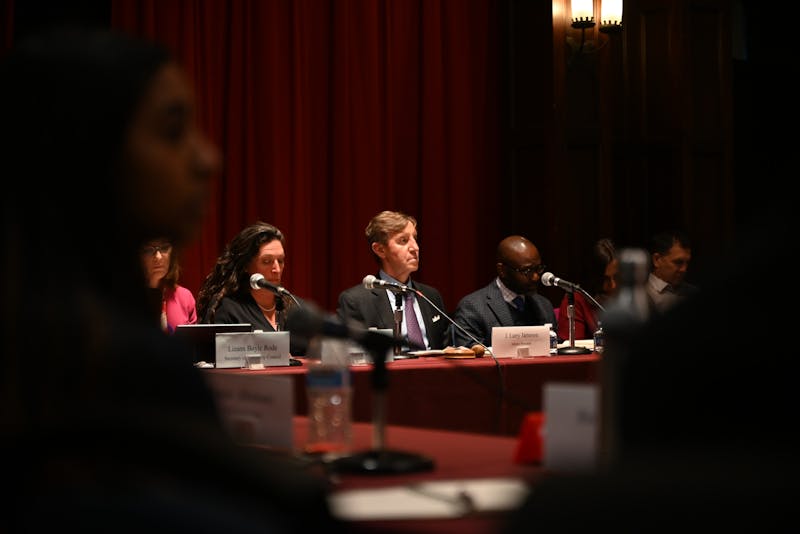Students with poor academic recordsStudents with poor academic recordsfind help within the University,Students with poor academic recordsfind help within the University,but some say it's not enough. Although Pete Kimchuck's primary affiliation with the University is as an Education graduate student, he also spends time teaching other students to study. As a learning instructor for the University's Tutoring and Learning Resources, a branch of the Department of Academic Support Programs, Kimchuk helps Penn students who are in danger of being expelled due to failing grades. After his first three semesters at the University, College sophomore Brian Federman received a letter stating that he would have to take a year off from school because of failing grades. Back at the University this semester, Federman said his advisor suggested that he utilize Tutoring and Learning Resources -- but he has not. "I think that you have to figure out for yourself how to fix it," Federman said, referring to his academic difficulties. Federman added that the source of academic problems and solutions are different for everyone. "It's a motivational thing -- what did it for me was being home and working with people in a restaurant," he said. "I realized that I didn't want that for the rest of my life." According to Kimchuk, the University cannot force students to get help, but Tutoring and Learning Resources is one of several services that assist students falling below Penn's academic standards. Federman expressed mixed feelings about the University's policy of not requiring failing students to be tutored. He said that while a mandate might help students improve their grades, it would be a maddening requirement. Although the four undergraduate schools set similar academic standards, they independently review their own students' standing. Each school has the ability to put its students on various types of academic probations and to drop students as it sees fit. College of Arts and Sciences Assistant Dean for Academic Affairs Kent Peterman explained that failing students are first placed on a general probation. A student who is in danger of failing out of school then goes through four categories of "drop" that the College places students on -- deferred drop, mandatory leave of absence, drop and final drop. Peterman added that the College reserves the right to review each student's case individually and can override the system that is currently in place. The College Handbook, however, only sets guidelines for the first level of general probation. "If your average is below 2.0 in any semester, if you have two or more incompletes or if you have not completed five credits in the course of a year, you will be placed on academic probation," the handbook states. According to Peterman, general probation is a warning to students. "When students fall behind, we write to them and insist that they meet with advisors," Peterman said. He added that the College suggests that students utilize support services such as Tutoring and Learning Resources and the Writing Center. Statistics provided by Peterman show that for the 1995 fall semester, 42 students were placed on deferred drop -- what he refers to as "middle ground." Peterman explained that these students have not raised their grades above probation guidelines, but at the discretion of the College, they are given another chance to improve their grades. The College placed an additional 19 students on mandatory leave last fall, forcing them to take a semester off. Not many students are dropped, he said, and even fewer are dropped permanently. Only 10 students were dropped last semester. They left the University for a year, with the option to reapply. According to Peterman, students are almost always readmitted. "Final drop is a rare event," Peterman said. "It's hard to give reliable statistics. "We bend backwards to give students a second chance," Peterman emphasized. "There is lots of flexibility; rules are not hard and fast." But a female College sophomore, who was put on academic probation during freshman year, said she disagrees. Because of the sensitive nature of her status at the University, she asked to remain anonymous. The student said that no one set up a meeting with her when she first began having academic problems. She added that she does not feel the University has supported her. After having a difficult freshman year, she was notified that she was on academic probation for having two incompletes. That summer, she visited a friend who was staying at the University and realized that her PennCard had been deactivated. "I was taken off the rolls of the school," she said. "I didn't even know that it had happened." She said she then appealed to the College in order to reestablish her enrollment. "I didn't know if I was enrolled right before fall semester," she said, adding that it was especially stressful since she was not warned. Although the appeal was granted, she took a leave of absence by her own accord and returned to the University at the beginning of this semester. "Coming back to the school after not being here is difficult," she explained. "I don't expect to be babied, but they thrust you back in and you don't feel supported." Associate Director of Tutoring and Learning Resources Myrna Cohen said her program is often helpful for students at risk, but also provides service to students in good standing who would like to be more efficient in their studying. "There is no system at the University where we get the names of all students on academic probation and contact them," Cohen said. "There are many ways for them to know we're here," Cohen added. "But I don't think that everyone in danger knows about these resources." The female College sophomore said that while she does know the tutoring services exist, she does not know much about them and has never used Tutoring and Learning Resources. "I'm supposed to use them," she said. "I tell my parents I do, but I haven't really." Both Peterman and Cohen said it would be demoralizing to require students to seek academic help. Cohen said that while faculty members and academic advisors suggest that their students get tutors, many students come to the Tutoring and Learning Resources based on a fellow student's recommendation. "Most students are mature enough to request help," Cohen said. "Most students take referrals very seriously." According to Cohen, the learning instructors, who are primarily Education graduate students, do not tutor for content. Rather, they teach students strategies for learning, she added. Tutors who focus on content are also available through Tutoring and Learning Resources, Cohen said. Kimchuk, a learning instructor, said the most common scenario involves a first-year student who did not have to study in high school and now struggles through classes because he or she does not know how to study effectively. "It's usually not a matter of not understanding the process," Kimchuk said. "It's a matter of not understanding how to learn." Nursing School Undergraduate Dean Mary Naylor agreed with Kimchuk's scenario, citing new expectations and different types of courses as first-year students' main sources of trouble. "Rarely is it an intellectual problem," said Engineering Director of Admissions and Advising John Keenan. "Everyone we admit should succeed at the University of Pennsylvania. It may be an adjustment to University life." Cohen said she believes that the strategic tutors and instructors offer a solution to the primary scenario cited by administrators from all four undergraduate schools. "We help access and put together a plan which helps students pull apart all pieces of learning," she explained. "Changing the way you study and learn requires a great deal of motivation." Cohen added that it is problematic that students in academic trouble may not have the motivation to get help before small problems turn into large ones. "I wish more students met with tutors before they are in serious trouble," Cohen said. Kimchuk questioned whether students understand what Learning Resources does. "The people who know about us utilize us," he said. "And our service is as free as anything else you pay $25 grand for." Administrators cited the University's academic support services as part of the solution and described similar criteria for probation and drop. "We want to see these students meeting with academic advisors on a monthly basis, but we don't police," Wharton Director of Academic Affairs Joe Sun said. He added that every semester a committee of faculty members meets to review Wharton students' academic standing in order to make a "suspects list" of those students who failed to meet criteria. Peterman, Naylor and Keenan described similar committees in each of their schools.
The Daily Pennsylvanian is an independent, student-run newspaper. Please consider making a donation to support the coverage that shapes the University. Your generosity ensures a future of strong journalism at Penn.
DonatePlease note All comments are eligible for publication in The Daily Pennsylvanian.







